Hackney Carriage and Private Hire Vehicle Strategy 2023-2028
1. 0 Introduction
2.0 Strategic aims
3.0 Policy context
4.0 Vehicle age and emissions
5.0 Statutory taxi and private hire standards
6.0 Policies
7.0 Partners
8.0 Action plan
1.0 Introduction
Hackney Carriages (taxis) and Private Hire Vehicles (PHVs) are an important part of Reading’s integrated transport system. They are a useful, often vital component to completing journeys and may form part of a more sustainable longer distance multi modal trip or be used where no convenient alternative is available.
Taxis and PHVs are one of the most flexible elements of the transport system operating 24/7 on a commercial basis. In Reading, taxis and PHVs are integral to supporting local businesses to thrive by transporting residents and visitors around the Borough. The services are a primary mode of passenger transport for many people for whom mainstream public transport is not an option or suitable. Taxis and PHVs help support many disabled and vulnerable people to live more independent lives. They also play an important part in supporting the night-time economy, providing a safe and secure mode of transport for many people home.
The distinction between taxis and PHVs is that taxis are more accessible, can ply for work from a rank, can be hailed in the street and undertake prebooked work. PHVs can only be prebooked.
A safe, modern, clean, and affordable taxi and PHV service contributes to the local economy and benefits both local residents and visitors to Reading.
2.0 Strategic Aims
2.1 Statement
The Council is committed to ensuring the Hackney Carriage and Private Hire Sector remains integrated into our sustainable transport network to continue to move passengers to destinations safely, whilst contributing to the economy with minimal environmental impact. The Strategy aims to set out how we can achieve this and make improvements to the system over the next 5 years.
2.2 Strategic Objectives
The Council has set out 4 key objectives which underpin the basis of the strategy:
- Customer focused: high levels of customer service, accountable operators and drivers and a service which provides value for money.
- Safe: the sector is trusted; passengers are confident in using the services and vehicles are modern and accessible for all.
- Clean: the fleet is greener and cleaner helping to deliver services with a low environmental impact.
- Well regulated: the Council has an effective regulatory framework to administer and enforce statutory and local requirements, to benefit both the trade and customers.
We will achieve these objectives by:
- Regulating and developing a modern fleet of hackney carriages and private hire vehicles utilising the latest technology that is easy to book, with contactless payment and accessible for all.
- To consult and support the trade so drivers and operators can operate on a viable commercial basis and have confidence to invest in their service.
- Incentivise the uptake of Ultra Low Emission Vehicles (ULEV) and invest in charging infrastructure across the Town.
- Ensure that the Council’s engagement with the taxi and PHV sector enjoys a high degree of public confidence and that regulatory interventions are targeted, proportionate and consistent.
- Being transparent and accountable with up-to date policies and procedures which ensure compliance with statutory standards.
- Enhancing the online processing of licensing applications and communications with customers.
3.0 Policy Context
3.1 Reading Vision 2050
Reading 2050 Vision is an ambitious description of what Reading can be: a green tech city, a city of culture and diversity, and a city of rivers and parks. The vision identifies key elements for its delivery, including a number in which transport plays a major part. Transport will be critical to enhancing the connectivity needed to facilitate economic growth and enable everyone to enjoy the multitude of assets the town has to offer. The way in which we deliver this will be key to low carbon living and creating the green and healthy spaces to allow our communities to thrive. Technology will support our transport network, facilitating smart and efficient solutions, and maximising the impact that transport can make.
3.2 Climate Emergency
The Council has a long track record of acting on climate change both to reduce Reading’s emissions of the greenhouse gases which are causing climate change, and to prepare for the impacts. As our understanding of the potential impacts has improved, the urgency of the need to act has become apparent, this has resulted in the Council declaring a Climate Emergency in 2019.
Following the declaration of a Climate Emergency, the Climate Change Partnership developed “The Reading Climate Emergency Strategy 2020-25”. This set out priorities on the pathway to net zero for transport.
The main aims are for a low carbon future for transport in which emissions are cut by reducing the need to travel by more polluting modes of transport, shifting more journeys to sustainable modes of transport and supporting the transition from petrol/diesel to electric vehicles. In the process, this will improve health and wellbeing, while making transport infrastructure more resilient to climate impacts.
Key actions for the council in respect of the taxi and PHV trade include:
- Increase public electric vehicle charging points in council car parks, leisure centres, lamp columns, business premises and taxi ranks.
- Reduce emissions from the fleet by requiring all taxis and PHVs to be electric or hybrid by 2028 to improve air quality and reduce carbon emissions.
3.3 Reading Transport Strategy 2040
The Reading Transport Strategy 2040 is a statutory document (known as a Local Transport Plan) that outlines the high-level policy and strategy for transport to meet existing and future transport demand in the town to 2040.
The plan sets out key commitments with regards the taxi and PHV trade:
- The Council seeks to ensure that providers of taxi and private hire services adhere to the quality obligations set out in the relevant licences and are compliant with all relevant guidance on the conditions that arise from the application of the appropriate sections of legislation.
- The Council can revoke taxi and private hire licences if the licence holder does not meet their obligations. A penalty points system is in place for breaches of regulations, as set out in the licence holder handbook. Through these mechanisms, we will continue to work with taxi and private hire providers to deliver high-quality and reliable services in Reading.
- Technology can play a huge part in making taxis and PHVs more accessible to people with the introduction of apps, cashless pay systems and enabling ride sharing.
- The Council are also responsible for providing and maintaining suitable taxi ranks and pick- up points and will continue to liaise with operators to ensure adequate and appropriately located facilities across Reading. The Council will continue to support a shift towards electric taxis and will work with taxi and private hire service operators to identify ways in which we can support fleet changes.
3 key objectives are set out under the strategy – Policy RTS10:
- We will work with operators to deliver smart, accessible and efficient taxi services across the Borough.
- We will work with taxi and private hire services, offering support and incentives to encourage a shift towards the use of cleaner vehicles.
- We will require all taxis operating in Reading to be electric or hybrid vehicles by 2028.
In addition, a number of transport schemes and initiatives have been identified to help address challenges. These include establishing a sustainable Mobility as a Service Scheme (MaaS) allowing residents, commuters and visitors to simply plan, pay for and undertake multi-modal journeys through an easy-to-use app linked to a single payment platform. This would link various modes and operators such as bus services, rail services, cycle hire, e-scooters (if/when legalised), taxis, car share and car hire.
3.4 Reading Electric Vehicle Strategy 2040
The Reading Electric Vehicle (EV) Strategy forms part of the wider Sustainable Transport, Climate Emergency Strategy and Air Quality Action Plan (AQAP) policy areas that aim to address congestion, environment and air quality issues associated with our transport choices
A key driver to the successful adoption of electric vehicles is the ability to adequately charge vehicles. Having comprehensive, accessible, equitable and efficient charging infrastructure is essential in enabling the rapid adoption of electric vehicles.
The scope of the strategy includes consideration of specific transport sectors including Taxis and PHVs.
2021 Energy Saving Trust (EST) research1 showed that 95% of Taxi drivers would switch to EV with two in five planning to switch within the next 5 years, however many consider cost of electric vehicles as a major barrier to purchase or lease.
The EST research also identified that average taxi mileages reported were low: 81% stated their typical daily mileage was 100 miles or less. Usage patterns of both forms of taxi mean that access to Rapid and Ultra-Rapid charging would be important in the transition to EV Taxis. This will be important in allowing drivers to maximise their productive work time, and that charging infrastructure at company premises, and close to popular routes or ranks are beneficial to supporting the EV taxi business case. The Council will continue to look at innovative ways of supporting the trade to move to low emission and electric vehicles.
1 Energy Savings Trust (2021) Reading Taxi research
3.5 Role of the local authority in regulating the taxi system
As a Unitary Authority the Council is the Taxi Licensing Authority, within its boundary. It is the duty of the Council to regulate the quality of service and safety standards of both taxis and PHVs. Drivers of both must be licensed.
The Council seeks to promote and maintain an adequate supply and coverage of operators and vehicles across the Borough. It is also the Council’s responsibility to implement taxi ranks on the public highway, reasonably close to where people want to travel from, including key interchange points with bus and rail networks. The number of hackney vehicle licences is limited by the Council where applicants for a licence are required to undertake a knowledge test and a driving assessment.
The Licensing Team carry out annual inspections of operators at their respective bases. Enforcement officers conduct regular checks within the town in respect of driver’s licences, vehicle licences and conditions of vehicle. Multi-agency checks are carried out for example to check for unlicensed drivers or plying for hire. The Council resources officers to work on a shift system to conduct night-time/early hour checks. Enforcement costs are recovered through the fees structure.
The service also administers the Licensing process for school transport. These licences are issued by the Council to persons who wish to undertake limited forms of hire and reward work involving the transporting of children in accordance with contracts in place with the local authority.
3.6 Table 1: Breakdown of drivers and vehicle numbers by category
| Category | Number |
| Hackney Carriage Drivers | 377 |
| Hackney Carriage Vehicles | 225 |
| Private Hire Drivers | 573 |
| Private Hire Vehicles | 392 |
| Executive Private Hire Vehicles | 118 |
| Private Hire Operators | 28 |
| School Transport Drivers | 279 |
| School Transport Vehicles | 182 |
| School Transport Operators | 10 |
Figure 1: Number of vehicles by type
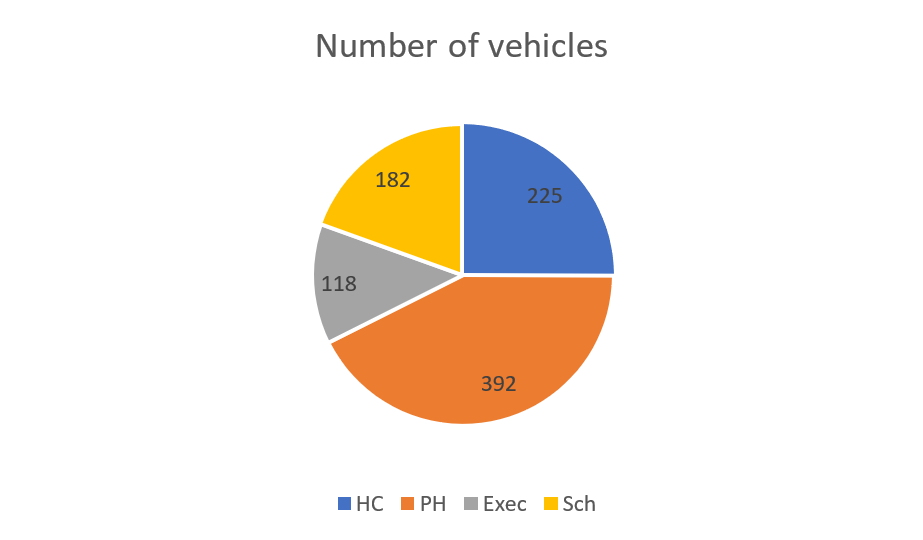
4.0 Vehicle Age and Emissions
The Council’s Hackney Carriage Vehicle Emissions and Age Policy 2019 intends to improve the hackney carriage vehicle fleet by removing older vehicles, creating a safer more reliable fleet and removing more polluting vehicles which will improve local air quality within Reading. The policy aims to encourage the move to cleaner vehicles and highlight the benefits to the trade as residents and businesses demand a greener alternative transport offer.
The policy uses a staged approach to remove the older and more polluting vehicles whose exhaust fumes are harmful to health and detrimental to the environment. The policy was formulated in consultation with the Taxi trade following the declaration of the Climate Change Emergency. The policy has set a target that all vehicles will be minimum ULEV by 1 October 2028.
Figure 2: Number and age of vehicles by type
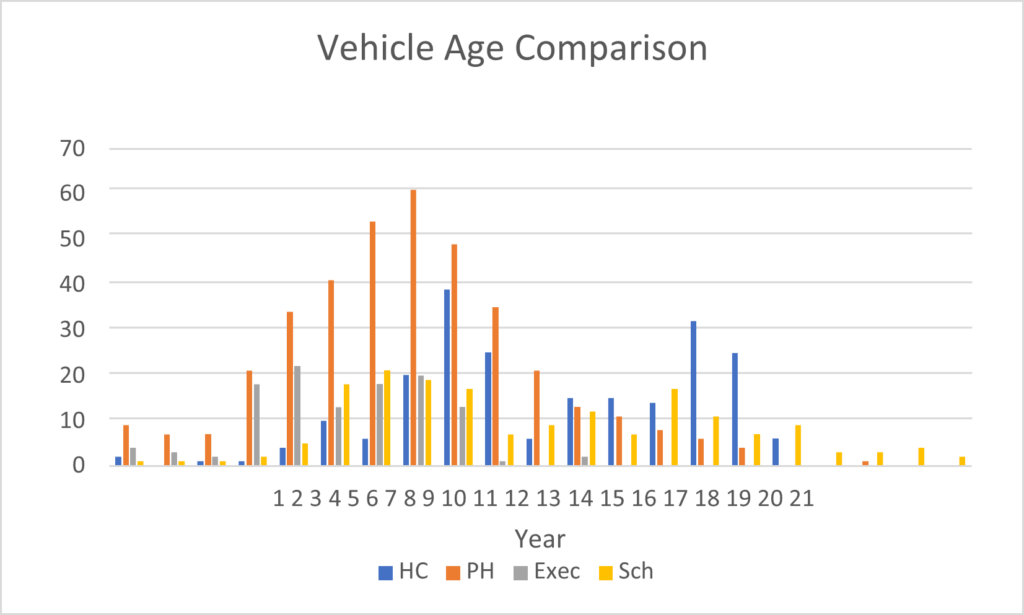
Figure 3: The Euro Emission Profile of the Hackney Carriage and Private Hire Fleet
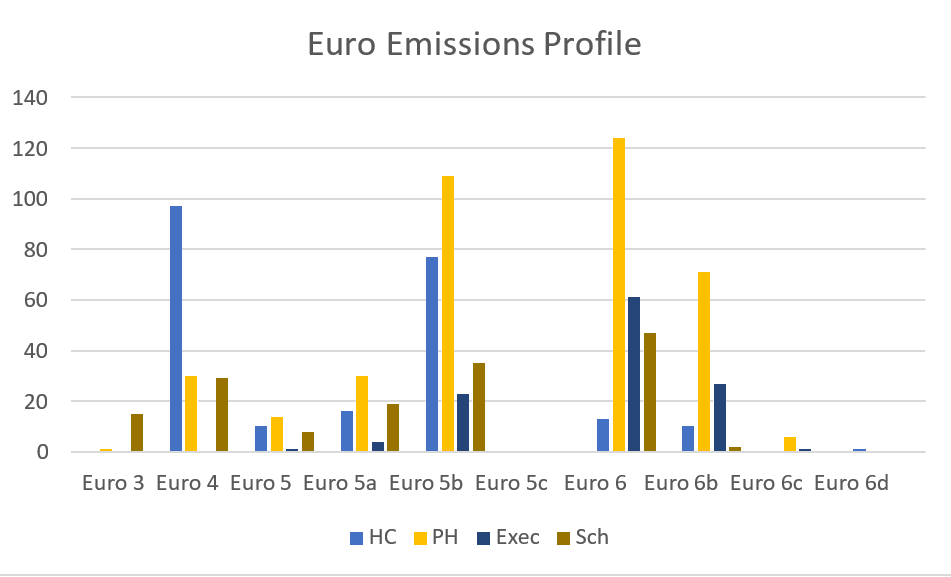
Figure 4: Vehicles by fuel type
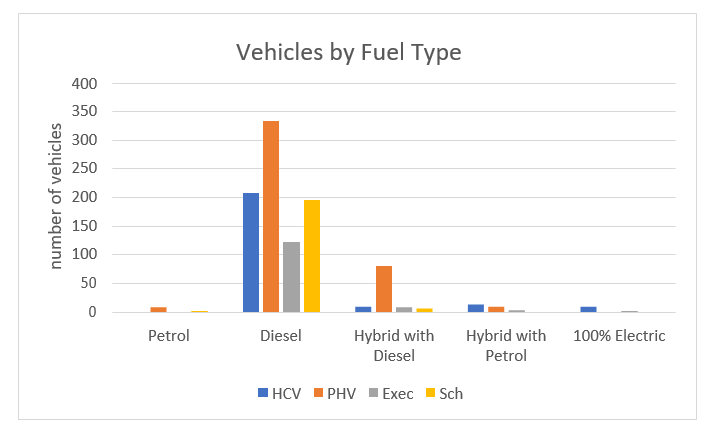
4.1 Unmet Demand Survey
The Council has adopted a policy to not issue any additional hackney carriage vehicle licenses unless there is evidence of significant unmet demand for hackney carriage services. This is reviewed at least every three years by way of an independent unmet demand survey being conducted. The last survey was conducted in 2018/19. Due to the impact of the Covid pandemic the Council will conduct the next survey in 2023.
4.2 Taxi Ranks
Taxi ranks are an important element in helping to manage the supply of taxis at busy locations. They help to reduce congestion and vehicle emissions by limiting the time drivers spend on the road while waiting to be hired. Ranks are important especially for disabled passengers as they allow enough time and space for wheelchairs to be loaded safely. 24-hour taxi ranks are provided at key transport interchanges to support the night-time economy.
The key issue the Council faces with ranks is competition for kerb side space from: bus stops, loading and general parking and the management of ranks with incidents of over ranking or idling vehicles. In addition, the town centre continues to undergo significant development which provides challenges both in the short term with accessibility and longer term in planning for positioning of ranks. Reading Station is a major transport hub in the Southeast and this has been enhanced with the opening of the Elizabeth Line.
Although there is no statutory duty to provide taxi rank spaces, the Council chooses to implement taxi ranks on the public highway close to where people want to travel from, including key interchange points with bus and rail networks. The Council will continue to consider making phased changes to the existing ranks in consultation with the trade and to prioritise Ultra Low Emission Vehicles ranks.
Figure 4: Plan of town centre showing taxi rank positions
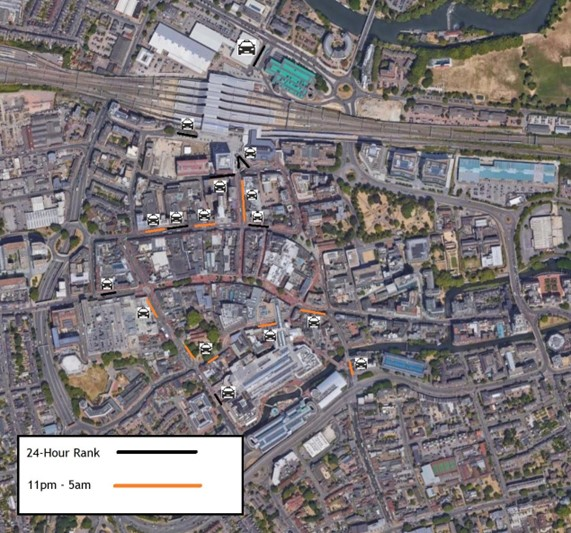
4.3 Wheelchair accessible vehicles
The Taxis and Private Hire Vehicles (Disabled Persons) Act 2022, which came into force on 28 June, is the most significant change to taxi accessibility legislation since the Equality Act was introduced 12 years ago. The 2022 Act amends the Equality Act 2010 to place duties on Hackney Carriage and Private Hire drivers and operators, so any disabled person has specific rights and protections to be transported and receive assistance when using a taxi or PHV without being charged extra.
The Act places a duty on local authorities to keep a publicly accessible register of licensed wheelchair-accessible taxis and PHVs which must be updated at least every 3 months or when details on the list require changing. The Council are committed to reviewing the type of hackney carriage vehicles licensed to ensure they are fully wheelchair accessible and to consider if the types of vehicles permissible on the fleet should be extended to meet these requirements.
4.4 App based taxi operations
The adoption of new technology by the sector and most significantly by the public, has resulted in a much-changed sector. The biggest change is the ease with which passengers can engage services using an app on a mobile phone. The Council are supportive of technological developments which both improve the customer experience and ensure safety measures are
adhered to. App based companies are licensed in the Borough and are subject to the same conditions and requirements as other operators. The Council will consider new applications which are in line with this strategy and comply with legal requirements.
4.5 National Highways and Transport (NHT) Public Satisfaction Survey Results
The council participates in the NHT Public Satisfaction Survey. This collects public perspectives and satisfaction with a range of Highway and Transport Services in the Local Authority area. The overall satisfaction rate for Taxi/mini cab services in 2022 was 66%. This was down 2% on the previous year but still above the national average of 61%.
4.6 Highways Use Benefits
The Council permits the use of bus lanes by licensed hackney carriage vehicles in Reading and hackney carriage vehicles licensed elsewhere that are wheelchair accessible. Private hire vehicles licensed in Reading or elsewhere are not authorised to use bus lanes.
The Council introduced one experimental traffic order in July 2019 which allows “authorised vehicles” to use the bus lane alongside buses, bicycles and motorcycles. In this context, “authorised vehicles” include licensed Hackney Carriages and Private Hire Vehicles licensed in Reading only.
The Council will continue to monitor the use of bus lanes and consider if any further traffic orders could be trialled or introduced. The Council considers that any changes to access must not undermine bus services and reliability and, if made, should primarily support Reading licensed vehicles. Any changes would have to consider that appropriate enforcement measures and necessary time restrictions are in place to ensure both bus and taxi journey times benefit and the service to the public improves. The council may also consider restricting access to newer, less polluting vehicles only.
5.0 Statutory Taxi and Private Hire Standards
Under the terms of the Policing and Crime Act 2017 the Department for Transport (DfT) has introduced minimum licensing standards for hackney carriages (taxis) and private hire vehicles. The standards were published in July 2020. The Council has a legal duty to have regard to the minimum standards when undertaking its taxi and private hire vehicle licensing function.
The Statutory Standards set-out a range of robust measures to protect taxi and private hire vehicle passengers, particularly those most vulnerable. Government advice is that Licensing Authorities must work to ensure that, above all else, the taxi and private hire vehicle services the public use are safe. DfT recommends all licensing authorities make publicly available a cohesive policy document that brings together all their procedures on taxi and private hire vehicle licensing.
The Council are committed to ensuring full compliance with these standards by assessing against the criteria, amending current polices and implementing an improvement action plan.
As part of the ongoing commitment to safety the council will consider introducing:
- A requirement for CCTV in Hackney Carriages and Private Hire Vehicles to protect both customers and drivers. The Council will examine how this could be achieved in consultation with the trade.
- Joint authorisations with other local authorities to aid enforcement of out-of-town vehicles. This would permit officers to enforce the conditions of the other authority against vehicles operating in their authority, or whilst officers are working in the other authority’s area.
- Data sharing protocol with respective agencies to improve the information received regarding offences, to make informed decisions as to whether to revoke licenses.
- English tests for drivers on initial application. The statutory standards highlight a lack of language proficiency could impact on a driver’s ability to understand written documents, policies and guidance, relating to the protection of children and vulnerable adults. A local area “knowledge” based test is currently required together with a verbal assessment to ascertain proficiency in English. It is recommended this be formalised through a recognised comprehension test.
6.0 Policies
The regulatory framework operated by the Council is underpinned through a number of policies and procedures which are subject to regular review. The Council makes changes to conditions to improve the service for example through agreeing taxi fare rates and introducing a mandatory requirement to accept contactless/card payments with no fee or minimum charge. Fees are calculated to ensure that the reasonable costs associated with providing the taxi licensing service can be recovered. The framework ensures that any surplus or deficit is considered when setting fees for subsequent years.
It is intended the polices will be reviewed against the strategic plan going forward.
Current policies include:
- Fees Policy
- Convictions Policy
- Penalty Points System
- Hackney Carriage and Private Hire Conditions
- Hackney Carriage Vehicle Emissions and Age Policy
- Taxi Fares
- School Transport Policy
7.0 To deliver this strategy the Council will work with partners including: Councillors, trade representatives, user groups, public transport operators, business representatives, Business Improvement District BID and Reading’s Economy & Destination Agency REDA.
8.0 Action Plan
| Number | Strategic objective | Action | Target date |
|---|---|---|---|
| 1 | Customer Focussed, Well Regulated | Review how consultation with the trade is conducted to maintain and enhance coverage and transparency. | June 2023 |
| 2 | Safe | Conduct a full assessment of policies against the Statutory Taxi & Private Hire Vehicle Standards and publish a policy document. | July 2023 |
| 3 | Safe | Review and implement a new Conviction Policy in line with the Statutory Standards. | July 2023 |
| 4 | Well Regulated, Customer Focussed, Safe | Review the School Transport Policy in line with the Statutory Taxi & Private Hire Vehicle Standards. | July 2023 |
| 5 | Well Regulated, Customer Focussed | Conduct the unmet demand survey. | September 2023 |
| 6 | Well Regulated, Safe | Explore Joint authorisations with other local authorities to aid enforcement of out-of-town vehicles. | October 2023 |
| 7 | Well Regulated, Safe | Implement mandatory English tests for drivers on application. | October 2023 |
| 8 | Well Regulated, Safe | Introduce Data sharing protocol with other agencies. | October 2023 |
| 9 | Clean | Creation of further measures to facilitate the uptake of low emission vehicles including reviewing eligible vehicle criteria and finance options. | October 2023 |
| 10 | Safe | Review the type of Hackney Carriage vehicle permitted on the fleet to increase wheelchair accessibility. | February 2024 |
| 11 | Clean | Reduce the age limit policy for Private Hire Vehicles. | April 2024 |
| 12 | Customer Focussed, Clean | Facilitate customer choice to book an ultra-low emission/ electric vehicle | April 2024 |
| 13 | Customer Focussed, Safe | Facilitate customer choice to book a wheelchair accessible hackney carriage and private hire vehicle. | April 2024 |
| 14 | Customer Focussed | Enhance the online application, renewal, booking payment and customer communication processes. | June 2024 |
| 15 | Well Regulated, Safe | Conduct feasibility study to introduce CCTV in Hackney Carriages and PHVs in compliance with data protection legislation. | July 2024 |
| 16 | Clean | Review taxi rank positions and capacity and consider ULEV only ranks. | September 2024 |
| 17 | Customer Focussed, Well Regulated | Review the use of bus lanes permissible for Hackney Carriages and PHVs. | April 2025 |